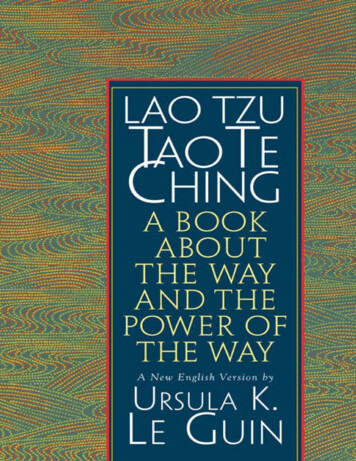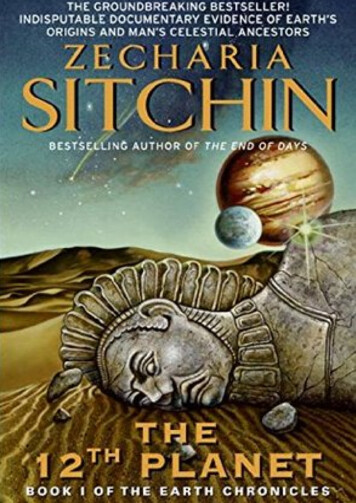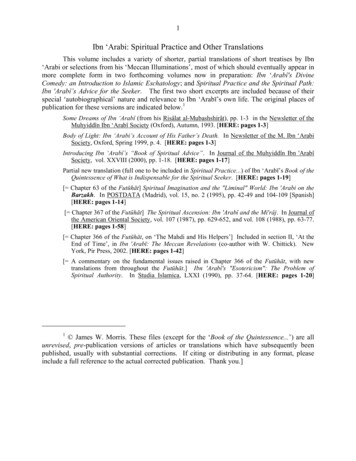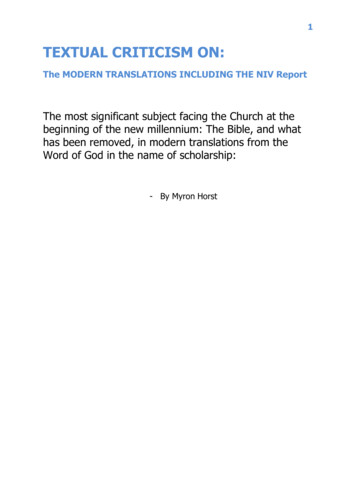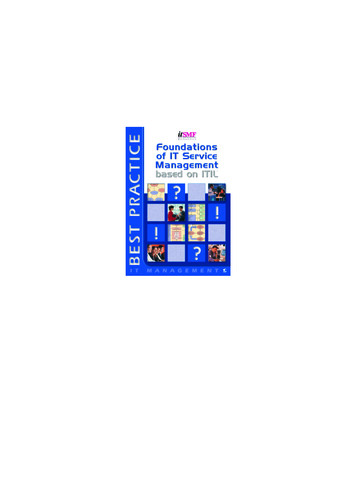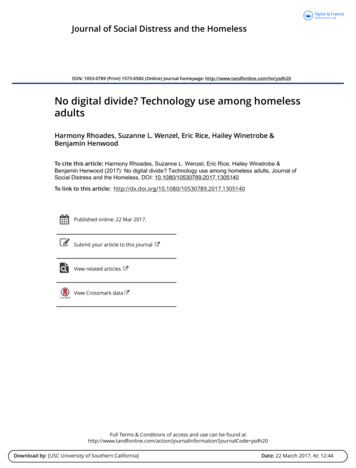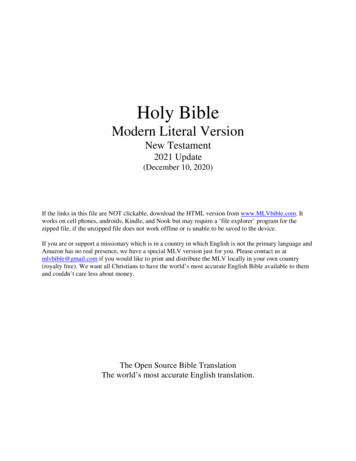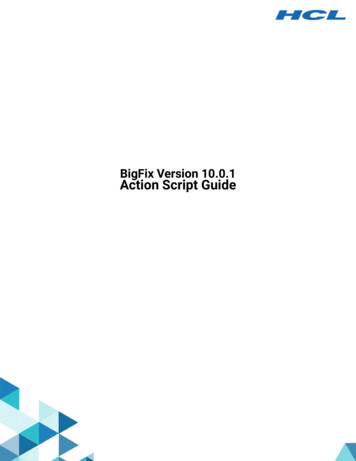
Transcription
“Reading [Le Guin’s] translations is like taking a shared walk down afamiliar trail where we discover rocks and water that we somehowmissed before. . . . undeniably refreshing, capturing a language that iscasual and clear, reflective and pointed, full of the wise humor of theWay.”—Parabola“A student of the Tao for several decades, Le Guin has created an Englishtext that will speak to modern readers in a fresh and lively way, whileconveying the humor, insight and beauty of the original.”—Shambhala Sun“Ursula K. Le Guin’s translation of the Tao Te Ching is a personal andpoetic meditation. Through her own careful study of these ancientteachings, she brings the Way into contemporary life. Each day, I open thisbook at random and receive a contemplative gift. These words are akin towater in the desert.”—Terry Tempest Williams, author of Refuge“Among the many translations of Lao Tzu’s Tao Te Ching, Ursula K. LeGuin’s new version is a special treasure—a delight. There is somethingstartlingly fresh and creatively alive here, brought forth by Ms. Le Guin’sintuitive and personal ingenuity. Her rendering has moved me to return tothe original Chinese text with rejuvenated fervor, rejoicing in theineffable sageness that lies in and between Lao Tzu’s lines.”—Chuangliang Al Huang, founder of the Living Tao Foundation, coauthor(with Alan Watts) of Tao: The Watercourse WayABOUT THE BOOKNo other English translation of this greatest of the Chinese classics canmatch Ursula Le Guin’s striking new version. Le Guin, best known forthought-provoking science fiction novels that have helped to transform thegenre, has studied the Tao Te Ching for more than forty years. She has
consulted the literal translations and worked with Chinese scholars todevelop a version that lets the ancient text speak in a fresh way to modernpeople, while remaining faithful to the poetic beauty of the work.Avoiding scholarly interpretations and esoteric Taoist insights, she hasrevealed the Tao Te Ching ’s immediate relevance and power, its depthand refreshing humor, in a way that shows better than ever before why ithas been so much loved for more than 2,500 years. Included are Le Guin’sown personal commentary and notes on the text. This new version is sureto be welcomed by the many readers of the Tao Te Ching as well as thosecoming to the text for the first time.URSULA K. LE GUIN is the winner of the Hugo, Nebula, Gandalf, Kafka,and National Book Awards. She is the author of many short stories andmore than fifteen novels, including The Left Hand of Darkness and TheDispossessed. She is also an honored author of children’s books, poetry,and criticism.
Sign up to learn more about our books and receive special offers fromShambhala Publications.Or visit us online to sign up at shambhala.com/eshambhala.
Shambhala Publications, Inc.Horticultural Hall300 Massachusetts AvenueBoston, Massachusetts 02115www.shambhala.com 1997 by Ursula K. Le GuinAll rights reserved. No part of this book may be reproduced in any form or by any means, electronic ormechanical, including photocopying, recording, or by any information storage and retrieval system, withoutpermission in writing from the publisher.The Library of Congress catalogues the hardcover edition of this book as follows:Lao-tzu.[Tao te ching. English]Lao Tzu: Tao te ching: a book about the way and the power of the way/a new English version byUrsula K. Le Guin, with J. P. Seaton.—1st ed.p. cm.eISBN 978-0-8348-2463-8ISBN 978-1-57062-333-2ISBN 978-1-57062-395-0 (pbk.)I. Le Guin, Ursula K., 1929– . II. Seaton, Jerome P. III. Title.BL 1900.L26E51997a97-18942299′.51482—dc2ICIP
ContentsIntroductionBook One1. Taoing2. Soul food3. Hushing4. Sourceless5. Useful emptiness6. What is complete7. Dim brightness8. Easy by nature9. Being quiet10. Techniques11. The uses of not12. Not wanting13. Shameless14. Celebrating mystery15. People of power16. Returning to the root17. Acting simply18. Second bests19. Raw silk and uncut wood20. Being different21. The empty heart22. Growing downward
23. Nothing and not24. Proportion25. Imagining mystery26. Power of the heavy27. Skill28. Turning back29. Not doing30. Not making war31. Against war32. Sacred power33. Kinds of power34. Perfect trust35. Humane power36. The small dark light37. Over allBook Two38. Talking about power39. Integrity40. By no means41. On and off42. Children of the Way43. Water and stone44. Fame and fortune45. Real power46. Wanting less47. Looking far48. Unlearning49. Trust and power50. Love of life51. Nature, nurture
52. Back to the beginning53. Insight54. Some rules55. The sign of the mysterious56. Mysteries of power57. Being simple58. Living with change59. Staying on the way60. Staying put61. Lying low62. The gift of the way63. Consider beginnings64. Mindful of little things65. One power66. Lowdown67. Three treasures68. Heaven’s lead69. Using mystery70. Being obscure71. The sick mind72. The right fear73. Daring to do74. The Lord of Slaughter75. Greed76. Hardness77. The bow78. Paradoxes79. Keeping the contract80. Freedom81. Telling it true
NotesConcerning This VersionSourcesNotes on Some Choices of WordingThe Two Texts of the Tao Te ChingNotes on the ChaptersE-mail Sign-Up
For A. L. K. and J. P. S.
IntroductionThe Tao Te Ching was probably written about twenty-five hundred years ago,perhaps by a man called Lao Tzu, who may have lived at about the same timeas Confucius. Nothing about it is certain except that it’s Chinese, and very old,and speaks to people everywhere as if it had been written yesterday.The first Tao Te Ching I ever saw was the Paul Carus edition of 1898,bound in yellow cloth stamped with blue and red Chinese designs andcharacters. It was a venerable object of mystery, which I soon investigated,and found more fascinating inside than out. The book was my father’s; he readin it often. Once I saw him making notes from it and asked what he was doing.He said he was marking which chapters he’d like to have read at his funeral.We did read those chapters at his memorial service.I have the book, now ninety-eight years old and further ornamented with redbinding-tape to hold the back on, and have marked which chapters I’d like tohave read at my funeral. In the Notes, I explain why I was so lucky to discoverLao Tzu in that particular edition. Here I will only say that I was lucky todiscover him so young, so that I could live with his book my whole life long.I also discuss other aspects of my version in the Notes—the how of it. HereI want to state very briefly the why of it.The Tao Te Ching is partly in prose, partly in verse; but as we define poetrynow, not by rhyme and meter but as a patterned intensity of language, the wholething is poetry. I wanted to catch that poetry, its terse, strange beauty. Mosttranslations have caught meanings in their net, but prosily, letting the beautyslip through. And in poetry, beauty is no ornament; it is the meaning. It is thetruth. We have that on good authority.Scholarly translations of the Tao Te Ching as a manual for rulers use avocabulary that emphasizes the uniqueness of the Taoist “sage,” hismasculinity, his authority. This language is perpetuated, and degraded, in mostpopular versions. I wanted a Book of the Way accessible to a present-day,unwise, unpowerful, and perhaps unmale reader, not seeking esoteric secrets,
but listening for a voice that speaks to the soul. I would like that reader to seewhy people have loved the book for twenty-five hundred years.It is the most lovable of all the great religious texts, funny, keen, kind,modest, indestructibly outrageous, and inexhaustibly refreshing. Of all the deepsprings, this is the purest water. To me, it is also the deepest spring.—Ursula K. Le GuinCommentaries at the foot of some of the chapters are my own responses to thetext. They are idiosyncratic and unscholarly, and are to be ignored if not foundhelpful. In the Notes at the end of the book are more detailed considerations ofsome of the chapters, thanks to my sources and guides, and remarks on how Iarrived at my version.
BOOK ONE
1TaoingThe way you can goisn’t the real way.The name you can sayisn’t the real name.Heaven and earthbegin in the unnamed:name’s the motherof the ten thousand things.So the unwanting soulsees what’s hidden,and the ever-wanting soulsees only what it wants.Two things, one origin,but different in name,whose identity is mystery.Mystery of all mysteries!The door to the hidden.A satisfactory translation of this chapter is, I believe, perfectly impossible. Itcontains the book. I think of it as the Aleph, in Borges’s story: if you see itrightly, it contains everything.
2Soul foodEverybody on earth knowingthat beauty is beautifulmakes ugliness.Everybody knowingthat goodness is goodmakes wickedness.For being and nonbeingarise together;hard and easycomplete each other;long and shortshape each other;high and lowdepend on each other;note and voicemake the music together;before and afterfollow each other.That’s why the wise souldoes without doing,teaches without talking.The things of this worldexist, they are;you can’t refuse them.To bear and not to own;
to act and not lay claim;to do the work and let it go:for just letting it gois what makes it stay.One of the things I read in this chapter is that values and beliefs are not onlyculturally constructed but also part of the interplay of yin and yang, the greatreversals that maintain the living balance of the world. To believe that ourbeliefs are permanent truths which encompass reality is a sad arrogance. To letgo of that belief is to find safety.
3HushingNot praising the praiseworthykeeps people uncompetitive.Not prizing rare treasureskeeps people from stealing.Not looking at the desirablekeeps the mind quiet.So the wise soulgoverning peoplewould empty their minds,fill their bellies,weaken their wishes,strengthen their bones,keep people unknowing,unwanting,keep the ones who do knowfrom doing anything.When you do not-doing,nothing’s out of order.Over and over Lao Tzu says wei wu wei: Do not do. Doing not-doing. To actwithout acting. Action by inaction. You do nothing yet it gets done. . . .It’s not a statement susceptible to logical interpretation, or even to asyntactical translation into English; but it’s a concept that transforms thought
radically, that changes minds. The whole book is both an explanation and ademonstration of it.
4SourcelessThe way is empty,used, but not used up.Deep, yes! ancestralto the ten thousand things.Blunting edge,loosing bond,dimming light,the way is the dust of the way.Quiet,yes, and likely to endure.Whose child? bornbefore the gods.Everything Lao Tzu says is elusive. The temptation is to grasp at somethingtangible in the endlessly deceptive simplicity of the words. Even some of hisfinest scholarly translators focus on positive ethical or political values in thetext, as if those were what’s important in it. And of course the religion calledTaoism is full of gods, saints, miracles, prayers, rules, methods for securingriches, power, longevity, and so forth—all the stuff that Lao Tzu says leads usaway from the Way.In passages such as this one, I think it is the profound modesty of thelanguage that offers what so many people for so many centuries have found inthis book: a pure apprehension of the mystery of which we are part.
5Useful emptinessHeaven and earth aren’t humane.To them the ten thousand thingsare straw dogs.Wise souls aren’t humane.To them the hundred familiesare straw dogs.Heaven and earthact as a bellows:Empty yet structured,it moves, inexhaustibly giving.The “inhumanity” of the wise soul doesn’t mean cruelty. Cruelty is a humancharacteristic. Heaven and earth—that is, “Nature” and its Way—are nothumane, because they are not human. They are not kind; they are not cruel:those are human attributes. You can only be kind or cruel if you have, andcherish, a self. You can’t even be indifferent if you aren’t different. Altruism isthe other side of egoism. Followers of the Way, like the forces of nature, actselflessly.
6What is completeThe valley spirit never dies.Call it the mystery, the woman.The mystery,the Door of the Woman,is the rootof earth and heaven.Forever this endures, forever.And all its uses are easy.
7Dim brightnessHeaven will last,earth will endure.How can they last so long?They don’t exist for themselvesand so can go on and on.So wise soulsleaving self behindmove forward,and setting self asidestay centered.Why let the self go?To keep what the soul needs.
8Easy by natureTrue goodnessis like water.Water’s goodfor everything.It doesn’t compete.It goes rightto the low loathsome places,and so finds the way.For a house,the good thing is level ground.In thinking,depth is good.The good of giving is magnanimity;of speaking, honesty;of government, order.The good of work is skill,and of action, timing.No competition,so no blame.A clear stream of water runs through this book, from poem to poem, wearingdown the indestructible, finding the way around everything that obstructs theway. Good drinking water.
9Being quietBrim-fill the bowl,it’ll spill over.Keep sharpening the blade,you’ll soon blunt it.Nobody can protecta house full of gold and jade.Wealth, status, pride,are their own ruin.To do good, work well, and lie lowis the way of the blessing.
10TechniquesCan you keep your soul in its body,hold fast to the one,and so learn to be whole?Can you center your energy,be soft, tender,and so learn to be a baby?Can you keep the deep water still and clear,so it reflects without blurring?Can you love people and run things,and do so by not doing?Opening, closing the Gate of Heaven,can you be like a bird with her nestlings?Piercing bright through the cosmos,can you know by not knowing?To give birth, to nourish,to bear and not to own,to act and not lay claim,to lead and not to rule:this is mysterious power.Most of the scholars think this chapter is about meditation, its techniques andfulfillments. The language is profoundly mystical, the images are charged, richin implications.The last verse turns up in nearly the same words in other chapters; there are
several such “refrains” throughout the book, identical or similar lines repeatedonce or twice or three times.
11The uses of notThirty spokesmeet in the hub.Where the wheel isn’tis where it’s useful.Hollowed out,clay makes a pot.Where the pot’s notis where it’s useful.Cut doors and windowsto make a room.Where the room isn’t,there’s room for you.So the profit in what isis in the use of what isn’t.One of the things I love about Lao Tzu is he is so funny. He’s explaining aprofound and difficult truth here, one of those counterintuitive truths that, whenthe mind can accept them, suddenly double the size of the universe. He goesabout it with this deadpan simplicity, talking about pots.
12Not wantingThe five colorsblind our eyes.The five notesdeafen our ears.The five flavorsdull our taste.Racing, chasing, hunting,drives people crazy.Trying to get richties people in knots.So the wise soulwatches with the innernot the outward eye,letting that go,keeping this.
13ShamelessTo be in favor or disgraceis to live in fear.To take the body seriouslyis to admit one can suffer.What does that mean,to be in favor or disgraceis to live in fear?Favor debases:we fear to lose it,fear to win it.So to be in favor or disgraceis to live in fear.What does that mean,to take the body seriouslyis to admit one can suffer?I suffer because I’m a body;if I weren’t a body,how could I suffer?So people who set their bodily goodbefore the public goodcould be entrusted with the commonwealth,and people who treated the body politicas gently as their own bodywould be worthy to govern the commonwealth.
Lao Tzu, a mystic, demystifies political power.Autocracy and oligarchy foster the beliefs that power is gained magicallyand retained by sacrifice, and that powerful people are genuinely superior tothe powerless.Lao Tzu does not see political power as magic. He sees rightful power asearned and wrongful power as usurped. He does not see power as virtue, butas the result of virtue. The democracies are founded on that view.He sees sacrifice of self or others as a corruption of power, and power asavailable to anybody who follows the Way. This is a radically subversiveattitude. No wonder anarchists and Taoists make good friends.
14Celebrating mysteryLook at it: nothing to see.Call it colorless.Listen to it: nothing to hear.Call it soundless.Reach for it: nothing to hold.Call it intangible.Triply undifferentiated,it merges into oneness,not bright above,not dark below.Never, oh! nevercan it be named.It reverts, it returnsto unbeing.Call it the form of the unformed,the image of no image.Call it unthinkable thought.Face it: no face.Follow it: no end.Holding fast to the old Way,we can live in the present.Mindful of the ancient beginnings,we hold the thread of the Tao.
15People of powerOnce upon a timepeople who knew the Waywere subtle, spiritual, mysterious, penetrating,unfathomable.Since they’re inexplicableI can only say what they seemed like:Cautious, oh yes, as if wading through a winter river.Alert, as if afraid of the neighbors.Polite and quiet, like houseguests.Elusive, like melting ice.Blank, like uncut wood.Empty, like valleys.Mysterious, oh yes, they were like troubled water.Who can by stillness, little by littlemake what is troubled grow clear?Who can by movement, little by littlemake what is still grow quick?To follow the Wayis not to need fulfillment.Unfulfilled, one may live onneeding no renewal.In the first stanza we see the followers of the Way in ancient times or illotempore, remote and inaccessible; but the second stanza brings them close and
alive in a series of marvelous similes. (I am particularly fond of the polite andquiet houseguests.) The images of the valley and of uncut or uncarved woodwill recur again and again.
16Returning to the rootBe completely empty. Be perfectly serene.The ten thousand things arise together;in their arising is their return.Now they flower,and floweringsink homeward,returning to the root.The return to the rootis peace.Peace: to accept what must be,to know what endures.In that knowledge is wisdom.Without it, ruin, disorder.To know what enduresis to be openhearted,magnanimous,regal,blessed,following the Tao,the way that endures forever.The body comes to its ending,but there is nothing to fear.To those who will not admit morality without a deity to validate it, orspirituality of which man is not the measure, the firmness of Lao Tzu’s morality
and the sweetness of his spiritual counsel must seem incomprehensible, orillegitimate, or very troubling indeed.
17Acting simplyTrue leadersare hardly known to their followers.Next after them are the leadersthe people know and admire;after them, those they fear;after them, those they despise.To give no trustis to get no trust.When the work’s done right,with no fuss or boasting,ordinary people say,Oh, we did it.This invisible leader, who gets things done in such a way that people think theydid it all themselves, isn’t one who manipulates others from behind the scenes;just the opposite. Again, it’s a matter of “doing without doing”: uncompetitive,unworried, trustful accomplishment, power that is not force. An example oranalogy might be a very good teacher, or the truest voice in a group of singers.
18Second bestsIn the degradation of the great waycome benevolence and righteousness.With the exaltation of learning and prudencecomes immense hypocrisy.The disordered familyis full of dutiful children and parents.The disordered societyis full of loyal patriots.
19Raw silk and uncut woodStop being holy, forget being prudent,it’ll be a hundred times better for everyone.Stop being altruistic, forget being righteous,people will remember what family feeling is.Stop planning, forget making a profit,there won’t be any thieves and robbers.But even these three rulesneedn’t be followed; what works reliablyis to know the raw silk,hold the uncut wood.Need little,want less.Forget the rules.Be untroubled.This chapter and the two before it may be read as a single movement ofthought.“Raw silk” and “uncut wood” are images traditionally associated with thecharacters su (simple, plain) and p’u (natural, honest).
20Being differentHow much difference between yes and no?What difference between good and bad?What the people fearmust be feared.O desolation!Not yet, not yet has it reached its limit!Everybody’s cheerful,cheerful as if at a party,or climbing a tower in springtime.And here I sit unmoved,clueless, like a child,a baby too young to smile.Forlorn, forlorn.Like a homeless person.Most people have plenty.I’m the one that’s poor,a fool right through.Ignorant, ignorant.Most people are so bright.I’m the one that’s dull.Most people are so keen.I don’t have the answers.Oh, I’m desolate, at sea,adrift, without harbor.Everybody has something to do.
I’m the clumsy one, out of place.I’m the different one,for my foodis the milk of the mother.The difference between yes and no, good and bad, is something only the“bright” people, the people with the answers, can understand. A poor stupidTaoist can’t make it out.This chapter is full of words like huang (wild, barren; famine), tun(ignorant; chaotic), hun (dull, turbid), men (sad, puzzled, mute), and hu(confused, obscured, vague). They configure chaos, confusion, a“bewilderness” in which the mind wanders without certainties, desolate,silent, awkward. But in that milky, dim strangeness lies the way. It can’t befound in the superficial order imposed by positive and negative opinions, thegood/bad, yes/no moralizing that denies fear and ignores mystery.
21The empty heartThe greatest power is the giftof following the Way alone.How the Way does thingsis hard to grasp, elusive.Elusive, yes, hard to grasp,yet there are thoughts in it.Hard to grasp, yes, elusive,yet there are things in it.Hard to make out, yes, and obscure,yet there is spirit in it,veritable spirit.There is certainty in it.From long, long ago till nowit has kept its name.So it sawthe beginning of everything.How do I knowanything about the beginning?By this.Mysticism rises from and returns to the irreducible, unsayable reality of “this.”“This” is the Way. This is the way.
22Growing downwardBe broken to be whole.Twist to be straight.Be empty to be full.Wear out to be renewed.Have little and gain much.Have much and get confused.So wise souls hold to the one,and test all things against it.Not showing themselves,they shine forth.Not justifying themselves,they’re self-evident.Not praising themselves,they’re accomplished.Not competing,they have in all the world no competitor.What they used to say in the old days,“Be broken to be whole,”was that mistaken?Truly, to be wholeis to return.
23Nothing and notNature doesn’t make long speeches.A whirlwind doesn’t last all morning.A cloudburst doesn’t last all day.Who makes the wind and rain?Heaven and earth do.If heaven and earth don’t go on and on,certainly people don’t need to.The people who work with Taoare Tao people,they belong to the Way.People who work with powerbelong to power.People who work with lossbelong to what’s lost.Give yourself to the Wayand you’ll be at home on the Way.Give yourself to powerand you’ll be at home in power.Give yourself to lossand when you’re lost you’ll be at home.To give no trustis to get no trust.
24ProportionYou can’t keep standing on tiptoeor walk in leaps and bounds.You can’t shine by showing offor get ahead by pushing.Self-satisfied people do no good,self-promoters never grow up.Such stuff is to the Taoas garbage is to foodor a tumor to the body,hateful.The follower of the Wayavoids it.
25Imagining mysteryThere is somethingthat contains everything.Before heaven and earthit is.Oh, it is still, unbodied,all on its own, unchanging,all-pervading,ever-moving.So it can act as the motherof all things.Not knowing its real name,we only call it the Way.If it must be named,let its name be Great.Greatness means going on,going on means going far,and going far means turning back.So they say: “The Way is great,heaven is great,earth is great,and humankind is great;four greatnesses in the world,and humanity is one of them.”People follow earth,earth follows heaven,
heaven follows the Way,the Way follows what is.I’d like to call the “something” of the first line a lump—an unshaped,undifferentiated lump, chaos, before the Word, before Form, before Change.Inside it is time, space, everything; in the womb of the Way.The last words of the chapter, tzu jan, I render as “what is.” I was temptedto say, “The Way follows itself,” because the Way is the way things are; butthat would reduce the significance of the words. They remind us not to see theWay as a sovereignty or a domination, all creative, all yang. The Way itself is afollower. Though it is before everything, it follows what is.
26Power of the heavyHeavy is the root of light.Still is the master of moving.So wise souls make their daily marchwith the heavy baggage wagon.Only when safein a solid, quiet housedo they lay care aside.How can a lord of ten thousand chariotslet his own personweigh less in the balance than his land?Lightness will lose him his foundation,movement will lose him his mastery.I take heaviness to be the root matters of daily life, the baggage we bodilybeings have to carry, such as food, drink, shelter, safety. If you go charging toofar ahead of the baggage wagon you may be cut off from it; if you treat yourbody as unimportant you risk insanity or inanity.The first two lines would make a nice motto for the practice of T’ai Chi.
27SkillGood walkers leave no track.Good talkers don’t stammer.Good counters don’t use their fingers.The best door’s unlocked and unopened.The best knot’s not in a rope and can’t be untied.So wise souls are good at caring for people,never turning their back on anyone.They’re good at looking after things,never turning their back on anything.There’s a light hidden here.Good people teach people who aren’t good yet;the less good are the makings of the good.Anyone who doesn’t respect a teacheror cherish a studentmay be clever, but has gone astray.There’s a deep mystery here.The hidden light and the deep mystery seem to be signals, saying “think aboutthis”—about care for what seems unimportant. In a teacher’s parental care forthe insignificant student, and in a society’s respect for mothers, teachers, andother obscure people who educate, there is indeed illumination and aprofoundly human mystery. Having replaced instinct with language, society,and culture, we are the only species that depends on teaching and learning. Wearen’t human without them. In them is true power. But are they the occupationsof the rich and mighty?
28Turning backKnowing manand staying woman,be the riverbed of the world.Being the world’s riverbedof eternal unfailing poweris to go back again to be newborn.Knowing lightand staying dark,be a pattern to the world.Being the world’s patternof eternal unerring poweris to go back again to boundlessness.Knowing gloryand staying modest,be the valley of the world.Being the world’s valleyof eternal inexhaustible poweris to go back again to the natural.Natural wood is cut upand made into useful things.Wise souls are usedto make into leaders.Just so, a great carvingis done without cutting.
The simplicity of Lao Tzu’s language can present an almost impenetrabledensity of meaning. The reversals and paradoxes in this great poem are theoppositions of the yin and yang—male/female, light/dark, glory/modesty—butthe “knowing and being” of them, the balancing act, results in neither stasis norsynthesis. The riverbed in which power runs leads back, the patterns of powerlead back, the valley where power is contained leads back—to the forevernew, endless, straightforward way. Reversal, recurrence, are the movement,and yet the movement is onward.
29Not doingThose who think to win the worldby doing something to it,I see them come to grief.For the world is a sacred object.Nothing is to be done to it.To do anything to it is to damage it.To seize it is to lose it.Under heaven some things lead, some follow,some blow hot, some cold,some are strong, some weak,some are fulfilled, some fail.So the wise soul keeps awayfrom the extremes, excess, extravagance.For Lao Tzu, “moderation in all things” isn’t just a bit of safe, practicaladvice. To lose the sense of the sacredness of the world is a mortal loss. Toinjure our world by excesses of greed and ingenuity is to endanger our ownsacredness.
30Not making warA Taoist wouldn’t advise a rulerto use force of arms for conquest;that tactic backfires.Where the army marchedgrow thorns and thistles.After the warcome the bad harvests.Good leaders prosper, that’s all,not presuming on victory.They prosper without boasting,or domineering, or arrogance,prosper because they can’t help it,prosper without violence.Things flourish then perish.Not the Way.What’s not the Waysoon ends.This first direct statement of Lao Tzu’s pacifism is connected in thought to theprevious poem and leads directly to the next.The last verse is enigmatic: “Things flourish then perish”—How can thissupremely natural sequence not be the Way? I offer my understanding of it inthe note on the page with chapter 55, where nearly the same phrase occurs.
31Against warEven the best weaponis an unhappy tool,hateful to living things.So the follower of the Waystays away from it.Weapons are unhappy tools,not chosen by thoughtful people,to be used only when there is no choice,and with a calm, still mind,without enjoyment.To enjoy using weaponsis to enjoy killing people,and to enjoy killing peopleis to lose your share in the common good.It is right that the murder of many peoplebe mourned and lamented.It is right that a victor in warbe received with f
Included are Le Guin's own personal commentary and notes on the text. This new version is sure to be welcomed by the many readers of the Tao Te Ching as well as those coming to the text for the first time. URSULA K. LE GUIN is the winner of the Hugo, Nebula, Gandalf, Kafka, and National Book Awards. She is the author of many short stories and



